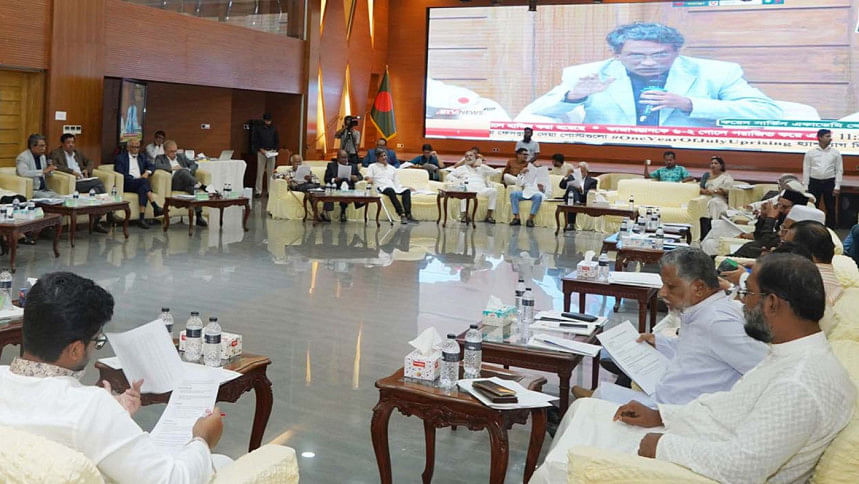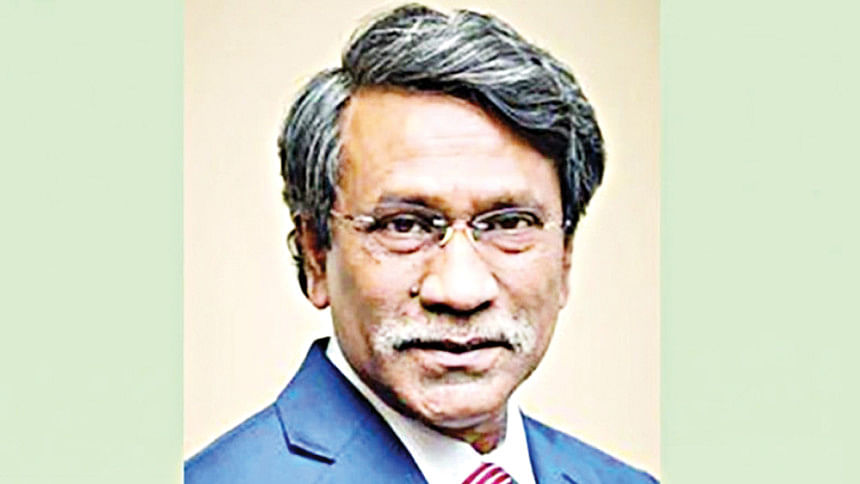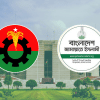Consensus commission: Fresh caretaker models on the table now

The National Consensus Commission, BNP, and Bangladesh Jamaat-e-Islami have each proposed separate methods for appointing the chief adviser to caretaker government.
On the 12th day of the second phase of reform talks at the Foreign Service Academy yesterday, the commission proposed forming a 13-member search committee, comprising representatives from the three major parties across both parliamentary chambers.
The BNP proposed that the president appoint the chief adviser from among qualified citizens, following consultations with all major political parties in the lower house.
Bangladesh Jamaat-e-Islami recommended a search committee with five members from the ruling party, five from the main opposition, and two from smaller parties or independents.
Meanwhile, the National Citizen Party opposed the judiciary's involvement in the caretaker government. NCP leader Javed Rasin said, "We reject the politicisation of the judiciary."
The party, however, did not make any new proposals yesterday for caretaker government framework or the appointment of the chief adviser.
Earlier on July 2, it proposed forming an 11 member All Party Parliamentary Committee, with each party nominating three candidates in the lower house. If one candidate secures an eight-to-three majority, they would be appointed chief adviser.

The commission has asked all parties to submit full written proposals, if they have any, by 10:00am today, with the caretaker government leadership model scheduled for further deliberation in the coming days.
If consensus still cannot be reached, the upper house could appoint the chief adviser from those ranking highest among proposed candidates, the NCP said.
This is the third time the consensus commission has submitted a proposal on the matter, as consensus remains elusive.
Earlier, it had proposed that a National Constitutional Council pick a retired chief justice for appointment as chief adviser, in line with the 13th amendment to the constitution.
During the talks on July 9, it also proposed forming a seven-member Chief Adviser Selection Committee.
The commission has now asked all parties to submit full written proposals, if they have any, by 10:00am today, with the caretaker government leadership model scheduled for further deliberation in the coming days, Prof Ali Riaz, vice-president of the commission, told The Daily Star.
He added that discussions on the caretaker model will continue tomorrow (July 15), and expressed hope that a draft of the national charter will be ready by the end of the month.
In the first round of talks, almost all political parties agreed to revive the caretaker government system.
The non-partisan caretaker system was introduced in 1990 after dictator HM Ershad's fall, with then chief justice Shahabuddin Ahmed overseeing a neutral transition. Though informal at the time, the system ensured a free and fair election in 1991.
Political tensions, however, rose after the opposition boycotted the controversial February 1996 election, ultimately leading to the 13th amendment, which formalised the caretaker system.
In 2006, a dispute over who would head the interim government saw then-president Iajuddin Ahmed assume the additional role of chief adviser. This triggered a crisis that led to a military-backed caretaker government in 2007–08.
The Awami League abolished the system in 2011 through the 15th amendment.
In December last year, about five months after the ouster of the AL regime, the High Court annulled part of the 15th amendment that had scrapped the caretaker system.
COMMISSION'S PROPOSAL
According to the commission's new proposal, a 13-member Chief Adviser Search Committee will be formed 30 days before the end of the parliament's term.
It will include the prime minister, treasury bench leader, or the leader of the ruling party; the opposition leader; the speaker and deputy speaker of the lower house (the latter from the opposition); the deputy leader or chief whip of the lower house; one representative from the third-largest party in the lower house; the speaker and deputy speaker of the upper house; the leader of the largest party and the leader of a minority party in the upper house; one member of the upper house nominated by the president; and a representative from the third-largest party in that chamber.
Within 48 hours of its formation, the committee will convene to select the chief adviser, who will serve for 90 to 120 days following the dissolution of parliament.
The proposal adds that if this process fails, the ruling coalition and the main opposition will each propose five eligible candidates, while other parties represented in both chambers will jointly propose four more.
The search committee will then hold a hearing in the lower house within five days, with upper house members present, to review all 14 nominees.
After the hearing, the ruling and opposition blocs will each select one candidate from the other's list. They will also choose one nominee from the smaller parties' list. Additionally, the third-largest party will select one from the 10 candidates proposed by the ruling and opposition parties. The nominee receiving the highest number of selections will be appointed chief adviser.
If no consensus emerges, the committee will vote using a ranked-choice system, with the president appointing the candidate based on the result. The selected chief adviser may then appoint up to 15 advisers.
The commission clarified that if the upper house is not yet formed, the search committee will be reduced to seven members from the lower house only. The same selection process will apply.
BNP'S PROPOSAL
The BNP's proposal emphasised multiparty consultation, limits on presidential authority, and the possible revival of the 13th amendment to the constitution, said Standing Committee Member Salahuddin Ahmed at the meeting.
It stated that the president would appoint the chief adviser from among citizens eligible under article 58(Ga), following consultations with all major political parties in parliament.
The party also proposed forming a nomination committee chaired by the president, which would include the prime minister, the opposition leader, the speaker of the lower house, and the deputy speaker from the opposition. In this setup, the president would not have voting rights in the selection process.
An alternative committee structure was also proposed, comprising the prime minister, the opposition leader, the speaker and deputy speaker of the lower house, and one representative from the third-largest party.
In this version, the president would cast a tie-breaking vote if needed.
A third proposed format offered broader representation: in addition to the prime minister, opposition leader, and speaker, one representative from each of the opposition parties -- excluding the largest -- that secured at least five percent of the national vote would be included. The president would retain voting rights in this format as well.
If none of these approaches yield consensus, the BNP proposed reverting to the caretaker government model introduced under the 13th amendment.
In such a case, the nomination committee could propose a retired chief justice, provided the individual is under the age of 75.
As a final fallback, the BNP suggested that the president himself assume the role of chief adviser.
JAMAAT'S PROPOSAL
Nayeb-e-Ameer of Bangladesh Jamaat-e-Islami Syed Abdullah Muhammad Taher said his party verbally proposed a new process for selecting the caretaker chief.
It moved away from relying on the senior-most retired chief justice or involving the president directly. Instead, Jamaat recommended forming a 12-member bipartisan search committee composed entirely of elected representatives.
This committee would include five members from the ruling party, five from the main opposition, and two from smaller parties or independents.
The committee would publicly call for nominations, conduct interviews, and follow a formal selection process to recommend a candidate for chief adviser.
Taher added that Jamaat also floated an informal alternative: a three-member committee comprising the sitting prime minister, the opposition leader, and the chief justice. However, he clarified that this idea has not been formally submitted.
CONSENSUS ON CJ PICK, EMERGENCY
During yesterday's talks, the parties reached consensus on the appointment of the chief justice of the Supreme Court, as well as safeguards against the misuse of emergency powers.
They agreed that the most senior judge of the Appellate Division, based on service length, would be appointed as the next chief justice, unless a political party pledges in its manifesto to choose one of the top two senior judges and secures a mandate to do so.
The parties also decided to amend article 141 of the constitution to prevent the political misuse of emergency declarations.
As per the proposed revision to article 141A(1), the president may declare a state of emergency for a period not exceeding 90 days if convinced that Bangladesh's security or economic stability is threatened by war, external aggression, or natural calamity.
However, prior written approval from the cabinet, in the presence of the opposition leader, would be required.
Currently, the constitution allows emergency declarations for up to 120 days with only the prime minister's signature.
To ensure protection of fundamental rights during emergencies, the proposed amendment to article 47(3) ensures that no citizen's right to life, or protection from torture or from cruel, inhuman or degrading treatment or punishment, may be suspended or violated.


 For all latest news, follow The Daily Star's Google News channel.
For all latest news, follow The Daily Star's Google News channel. 







Comments